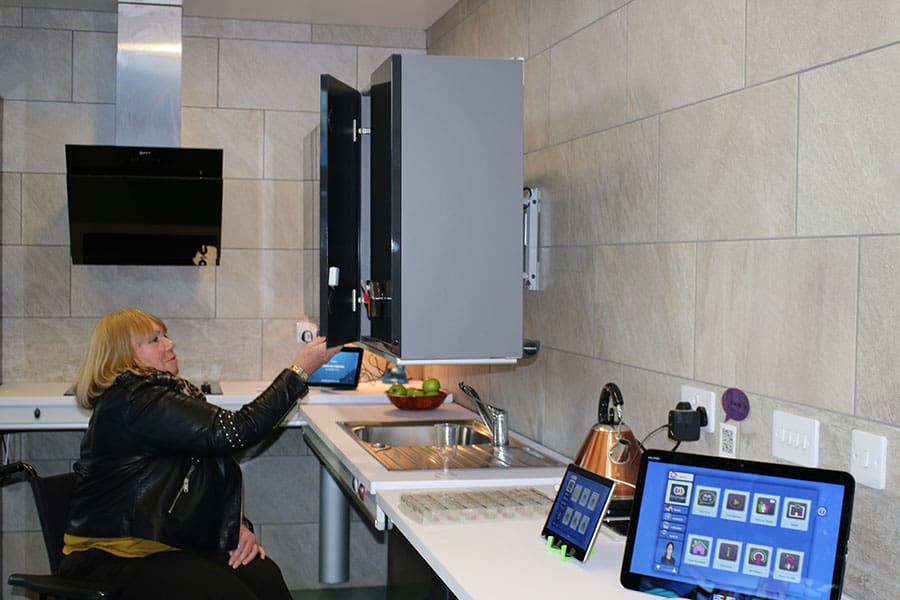Smart home tech set to revolutionise independent living in care homes

Smart meters and associated technologies are being used to monitor for health-related incidents around the home as part of a ground-breaking new trial led by The University of Edinburgh’s School of Informatics in partnership with housing and care specialist Blackwood Homes and Care and Scottish Innovation Centre, The Data Lab.
The “revolutionary” Smart Meters for Independent Living (SMILE) project will see the consortium develop and test machine learning and artificial intelligence (AI) methods to analyse energy usage data from consenting residents’ smart meters, creating a view of their daily routines and spotting unusual changes in behaviour which could cause concern.
Blackwood Homes and Care provides a range of accessible housing for people with disabilities and older people.
Colin Foskett, Head of Innovation at Blackwood Homes, said: “At Blackwood we are always looking for ways of enabling our customers to live more independently. The UK smart meter rollout programme presents an opportunity to use energy usage data for good.
“If we can prove the principle of the technology with this project, then we have an opportunity to provide a safety net for vulnerable people, to identify patterns of decline and provide early intervention, potentially saving lives and reducing hospital admissions.”
The trial began in November 2019 and, despite some delays caused by the coronavirus pandemic, is currently analysing energy usage data in several homes across Scotland.
Individuals and their loved ones or carers can set specific ‘rules’ for the system, telling it which changes in routine are a cause for concern. For example, the duration of a shower being longer than usual or a change to normal cooking schedules, which could indicate that an incident has occurred.
Machine learning algorithms use energy usage patterns to identify the timing of people’s relevant activities in the home, looking for changes that should be flagged up. The system will then alert the individual, their loved one or carer, enabling a decision on the best course of action to be made.
The ambition is that the new predictive digital technology will provide an additional service to complement the traditional proactive push button personal alarm worn by residents – particularly aiding people with dementia and those who may be confused, may forget or be unable to activate their current alarm.
The technology also has the potential to be used as a decision support tool, the university highlights, meaning that if it detects a resident getting up frequently during the night, health and care professionals can review whether they need changes in their support.
Findings of the trial are expected to be published in autumn 2021. The project is also supported by CareBuilder, Hildebrand, Mydex CIC & Smart Energy GB.
Gillian Docherty, CEO of The Data Lab, said: “This project has the potential to shape the way we view machine learning and AI in social care settings, by empowering individuals to go about their daily routines without worry and only receive carer intervention when necessary.
“Scotland has an aging population, and in the next few decades we need to find new ways to deliver the best possible social care against a backdrop of stretched resources and falling carer numbers. Machine learning and AI can be a non-invasive way to do this and will also encourage greater personalisation of care based on an individuals’ data.
“The SMILE project is funded as part of The Data Lab Collaborative Innovation programme and further strengthens the relationship between Blackwood Homes and The Data Lab, cementing the relationship for further support in terms of skills, network access and external funding support in the years ahead.
“We’re proud to be involved in such a forward-thinking project and look forward to receiving the initial findings soon. It is another fantastic example of data being used as a force for good.”
Last month, Blackwood Homes and Care launched a unique collection of 24 homes featuring “cutting-edge” technology to transform the lives of people with disabilities.
The innovative homes include automated sliding pocket doors, blinds and rise and fall surfaces, sinks and cupboards, allowing people with a broad range of mobility issues to live independently. Other special features include contemporary bathrooms fitted with a rise and fall sink, a fully-adjustable shower and a self-cleaning toilet.
Digital support through Blackwood’s digital care system, CleverCogs, allows residents to control of all aspects of the house.

